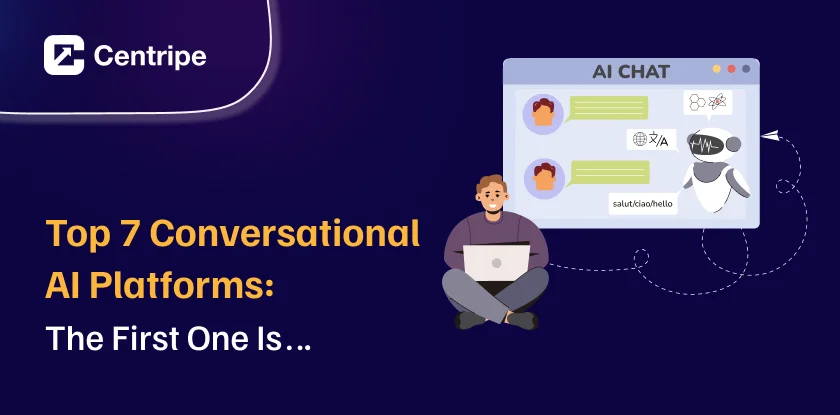Before we jump to anything, have a look at this:
The global conversational AI market is projected to reach $14.79 billion in 2025 and expand to $61.69 billion by 2032, with a compound annual growth rate (CAGR) of 22.6% during this period.
This ends the debate for whether we need conversational AI platforms or not. Every business requires it. It has changed the way of business talking to customers.
These smart tools help companies create customer service chatbots and virtual assistants. They can understand and respond to people naturally.
A conversational AI platform uses AI to build chatbots that can talk with users like real people.
These smart systems are different from simple chatbots. They grasp contexts, keep on learning with the chats and give useful answers.
From websites to messaging platforms, mobile apps to voice assistants, they work everywhere.
Conversational AI can handle up to 50% support queries instantly.This means it often doesn’t need human help.
What is Conversational AI platform?
Conversational AI platforms are clever tools. They help businesses chat with customers in a natural way, using text or voice.
They understand questions and respond like a human, learning from each interaction.
These platforms use natural language processing and machine learning. They understand user intent and give helpful answers.
They work on websites, apps, messaging, and voice assistants for faster, 24/7 support.
They enhance customer experience with fast, tailored replies. They also save businesses time by automating everyday tasks.
As they learn from conversations, they get better at helping customers every day.
Conversational AI Platforms – Brief Points
| Platform | Best Features | Suitable For |
|---|---|---|
| Centripe.ai | Advanced AI automation, seamless integrations, enterprise-grade security | Large enterprises, complex business automation needs |
| Dialogflow by Google | Natural language understanding, 20+ languages, Google integrations | Businesses using Google services, voice assistant development |
| CRMOne | Built-in CRM integration, lead qualification, omnichannel support | Sales teams, customer relationship management, lead generation |
| Microsoft Bot Framework | Enterprise security, multiple programming languages, Microsoft integrations | Companies using Microsoft products, enterprise solutions |
| Amazon Lex | Voice and text support, AWS integrations, usage-based pricing | AWS users, voice-enabled applications |
| IBM Watson Assistant | Advanced AI, enterprise features, detailed analytics | Large companies, complex business processes |
| Rasa | Open-source, full customization, data privacy | Technical teams, custom solutions |
7 Top Conversational AI Platforms
1. Centripe.ai
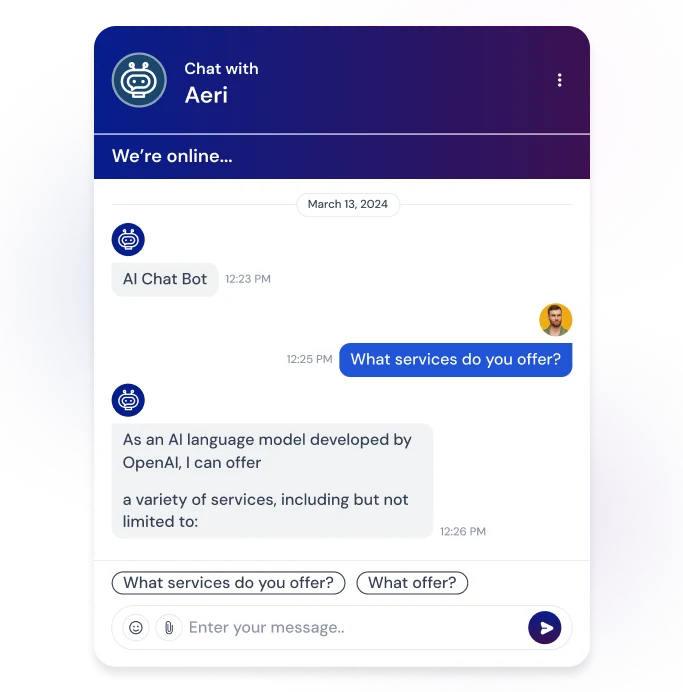
One of the best conversational AI platform. It helps you automate interactions and make the process smoother.
You can develop AI chatbots that will respond to customer queries across various channels.
Its focus is on Natural Language. So users get reply in a friendly manner. It even provides better support.
What impresses the businesses is it keeps on learning from conversations, be more accurate and helpful over time.
Also, it integrates with other tools easily. So the operations are seamless and data sharing becomes easy.
Companies use Centripe to boost sales, support, and engagement. It helps them be available for customers all day, every day.
Its flexibility helps it serve various industries and use cases. This is a great choice for businesses that want to update their customer service.
Centripe makes it easy for small businesses to create and manage chatbots. This helps them provide quick and professional responses.
What’s Best?
- No-code chatbot builder
- Automatic lead qualification
- Built-in multilingual support
- Integrated CRM solutions
How It Will Be Helpful To You?
Automating common customer questions lets human agents handle more complex issues. This also boosts workflow efficiency.
You can meet growing customer demands without increasing costs as your business expands.
2. Dialogflow by Google
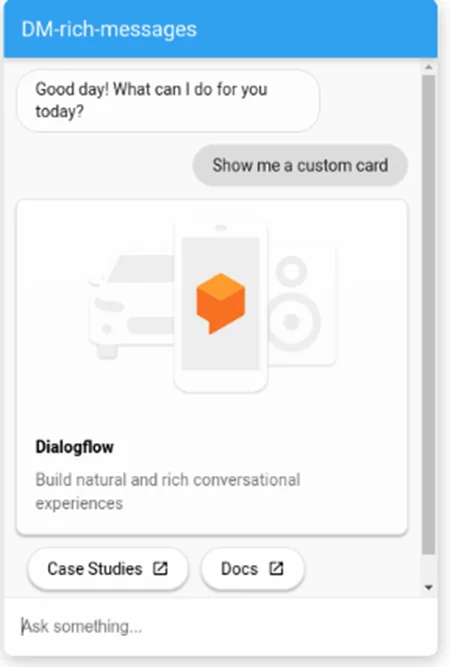
It assists developers in building chatbots and voice apps using Google’s AI libraries.
The platform is compatible with Go
Google’s Dialogflow is one of the most popular conversational AI platforms. It helps developers build chatbots and voice apps using Google’s powerful AI libraries.
The platform works well with Google Assistant, Google Cloud, and many other services.
The speciality of Dialogflow lies in the natural language understanding. You see, it figures out what users mean even when they don’t use exact keywords.
The platform supports more than 20 languages. It can also manage complex conversations about different topics.
Dialogflow has a free plan for small projects. For larger businesses, it offers paid plans.
It’s a smart pick for companies using Google services or looking to create voice assistants.
What’s Best?
- Advanced natural language understanding
- Google Cloud integration
- Voice and text support
- Pre-built industry templates
- Enterprise-level security features
How It Will Be Helpful To You?
Use Google’s strong AI tools to build smart chatbots. They can grasp context and intent very accurately.
Your business gets detailed analytics and insights on customer interactions. This helps you improve conversation flows and spot areas for growth.
3. CRMOne
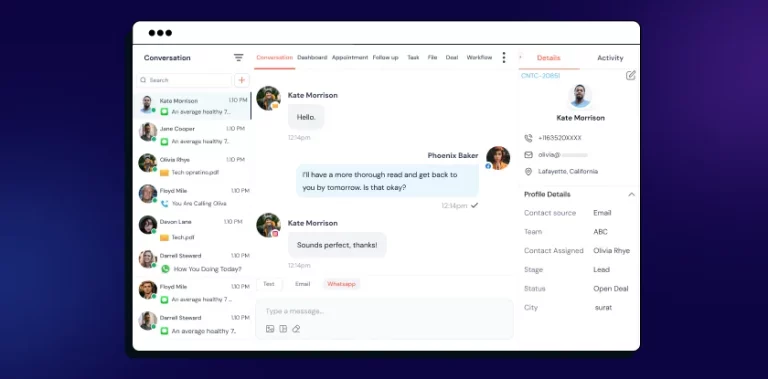
Everyone loves personalized messages. The AI-powered email writer will generate such emails that will save up time.
Users can create custom chatbots that is resourceful for their businesses and increases engagement on websites and apps.
These chatbots are so powerful that they can summarize the meetings and emails, analyze it to prioritize sales efforts. They will take this data and converse with the customers. So they will feel more important.
It integrates with live chat, email, social media, built-in calling, etc. so ir-respective of the platforms, the customers can always reach out to you.
Even centralizes customer communication and support tickets for managing and giving fast response.
What’s Best?
- Unified customer data management
- Automated lead scoring
- Sales pipeline integration
- Real-time reporting dashboards
How It Will Be Helpful To You?
Automate your customer journey from first contact to final sale. This reduces manual data entry and boosts conversion rates.
Your team can see all customer interactions on every channel. This helps you create personalised follow-up strategies and boosts customer retention.
4. Microsoft Bot Framework
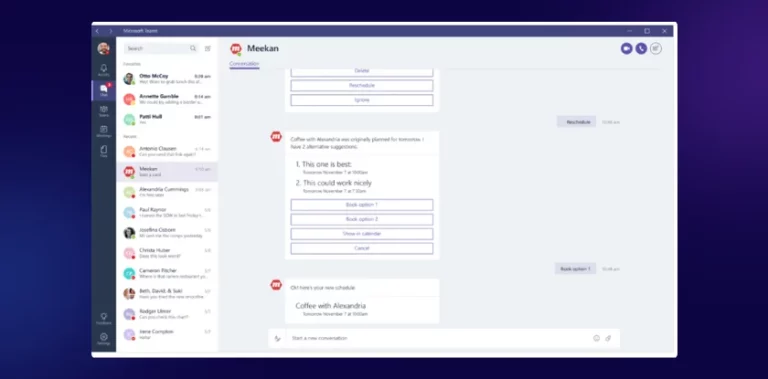
Microsoft Bot Framework is a complete set of tools for building chatbots.
It includes AI libraries, development tools, and hosting services. It works amazingly with Microsoft Teams, and other products. It even supports different languages like C+ and Java Script.
Business developers can use pre-built template or create custom solutions. The AI services help make chatbots smart.
For those using Microsoft products already, this platform is perfect for them.
It’s also ideal for those seeking strong security and support at the enterprise level.
What’s Best?
- Enterprise-grade security compliance
- Extensive customization options
- Microsoft ecosystem integration
- Cognitive services support
- Hybrid cloud deployment
How It Will Be Helpful To You?
You can create advanced bots that work well with Microsoft systems. This makes it easier to set up and train users.
Your development team relies on solid documentation, active community support, and flexible deployment options that change with business needs.
5. Amazon Lex
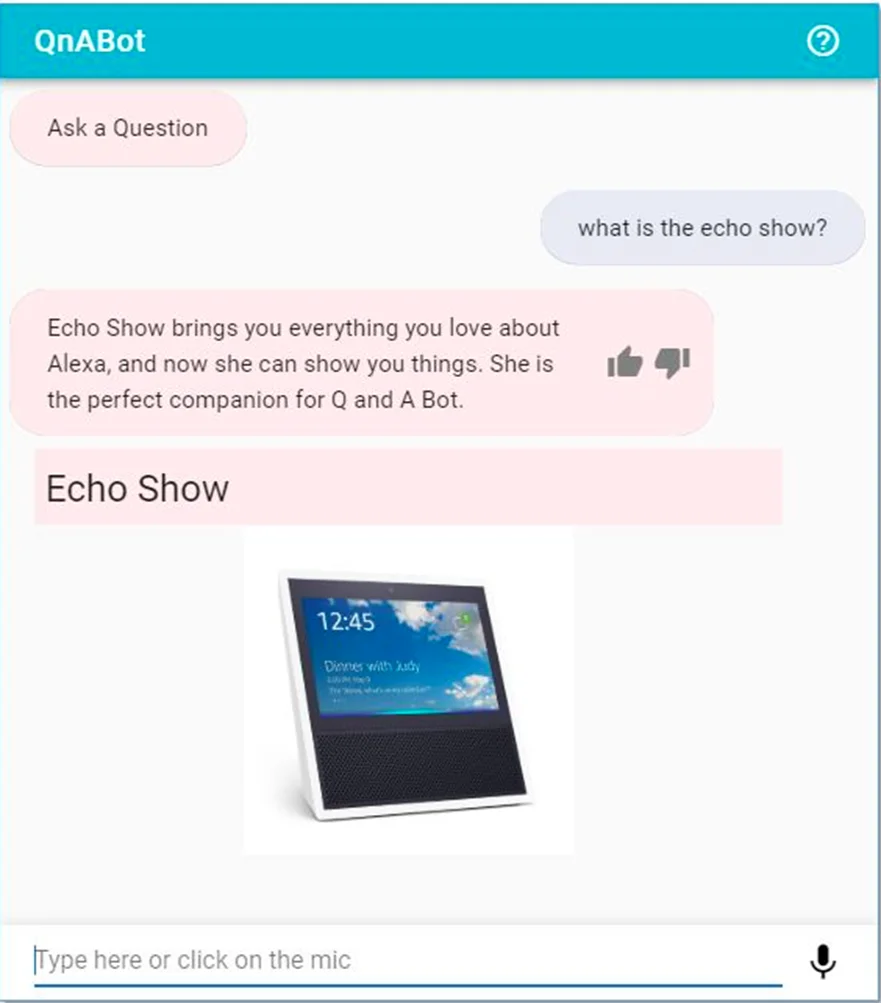
Amazon Lex is the same technology that powers Alexa.
It’s a top platform for creating voice and text chatbots. Lex uses Amazon’s machine learning to understand speech and text.
The platform connects easily with other Amazon Web Services like Lambda and DynamoDB.
This makes it easy to create strong chatbots. These chatbots can access databases and perform complex tasks.
Amazon Lex charges you based on how much you use it.
This makes it affordable for businesses of any size. It’s great for companies using AWS or those looking to create voice-enabled apps.
What’s Best?
- Alexa-powered technology
- Pay-per-use pricing
- AWS services integration
- Voice and text interfaces
How It Will Be Helpful To You?
You can build voice-enabled customer experiences that feel natural and easy. This reduces friction in interactions and boosts satisfaction scores.
Your business gains from Amazon’s strong infrastructure. It ensures high availability and a global reach for customer support operations.
6. IBM Watson Assistant
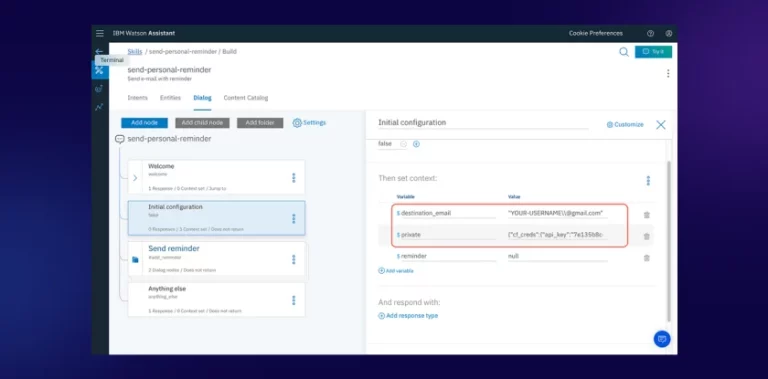
IBM Watson Assistant is a professional conversational AI platform designed for enterprise use.
It can handle complex business processes and integrate with existing company systems.
Now this assistant is not just the typical one. It uses advanced AI libraries to understand the context so that it can give suitable answers.
The platform provides detailed analytics. This helps businesses see how customers use their chatbots.
This platform is perfect for large companies needing powerful AI features and excellent support.
What’s Best?
- Industry-specific terminology understanding
- Enterprise governance features
- Multi-turn conversation handling
- Advanced AI training capabilities
- Comprehensive analytics tools
How It Will Be Helpful To You?
You can use chatbots that understand tough business issues and provide clear answers to industry questions.
Your organisation gains clear insights into customer intent patterns. You also see how effective conversations are through detailed reporting dashboards.
7. Rasa
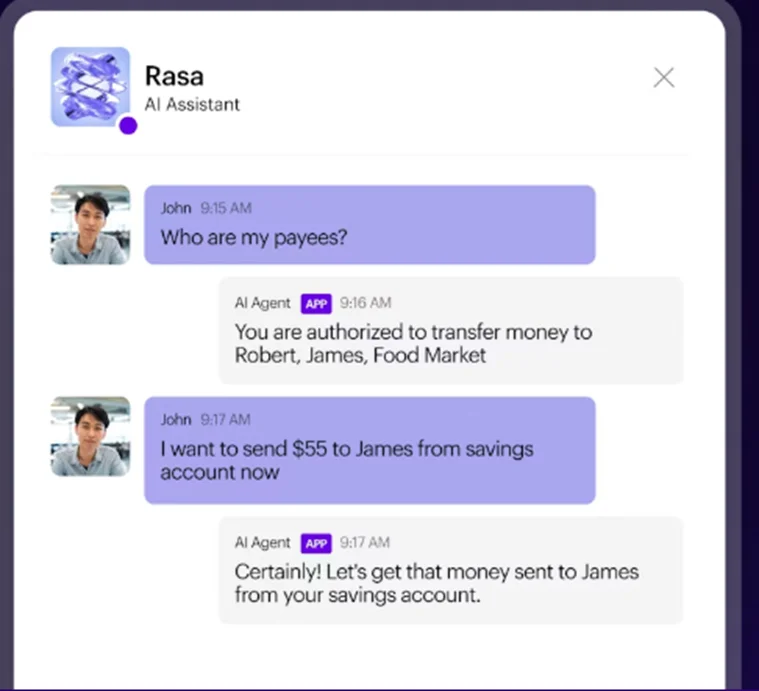
Rasa’s USP is, it being the open-source platform that lets developers control the chatbots.
Its unique because there is no pre-determined conditions. Its all about your business and how you want to develop the bots.
Companies can keep their data private and customize. It has tools for NL understanding and dialogue management.
The AI libraries can be used to create chatbots that do exactly what the developers desire.
What’s Best?
- Open-source framework
- Complete data control
- Customizable NLU pipeline
- On-premise deployment option
How It Will Be Helpful To You?
You have complete control over your conversational AI. You can customise every part of the bot’s behaviour to fit your business needs.
Your development team can tap into the active open-source community for help. This also ensures data privacy and meets regulatory requirements.
How to Choose the Right Conversational AI Platform?
| Factor | What to Consider |
|---|---|
| Business Goals | Think about why you want a chatbot – customer service, lead generation, or task automation |
| Technical Skills | Consider your team’s coding abilities and technical knowledge |
| Budget | Different platforms have various pricing models – monthly fees, usage-based, or freemium |
| Integration Needs | What tools does your chatbot need to connect with (CRM, payments, marketing tools) |
| Growth & Scale | How many conversations will you handle now and in the future |
| Languages & Channels | What languages do your customers speak and where do they chat |
| Analytics | Do you need basic reports or detailed insights about chatbot performance |
| Security | How sensitive is your customer data and what compliance do you need |
| Support | What kind of help do you need when building and maintaining your chatbot |
| Voice Capabilities | Need voice interactions and phone support |
Conclusion
Conversational AI platforms are essential tools for modern businesses. They help companies provide better customer service, increase sales, and automate repetitive tasks.
The 7 platforms we talked about each offer unique strengths and features for various business needs.
When picking a conversational AI platform, think about your goals, skills, budget, and how it fits with your current systems. First, know what you want to achieve. Then, check platforms to see how well they meet your needs.
The best chatbot development platforms are those that suit your needs. A simple platform can suit a small business well. But a large company may need enterprise features and advanced AI libraries.
